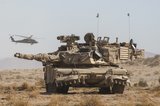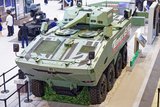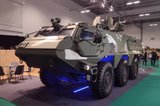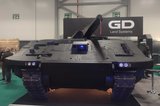Jaguar EBRC qualification process includes MMP test-firing
MMP was test-fired in lock-on mode from a Jaguar EBRC for the first time in April 2021. (Photo: MBDA)
MBDA and Nexter last month carried out the first lock-on firing of a Medium Range Missile (MMP) from a Jaguar EBRC 6x6 armoured reconnaissance and combat vehicle.
The test was conducted on 14 April in conjunction with French defence procurement agency DGA as part of the qualification process for Jaguar.
‘Launched from the retractable pod on the Jaguar’s turret in two-missile configuration, the MMP successfully hit its target,’ MBDA stated on 11 May. Integration of MMP with Jaguar EBRC is being carried out in stages during qualification, with firing as the first stage to demonstrate that the missile can hit a fixed target.
‘During this demonstration, the Optrolead PASEO battlefield surveillance sight interfaced with the missile system, offering real-time optronic acquisition by day and by night. This gives the Jaguar excellent long-range observation and identification capabilities,’ MBDA noted.
MMP is designed to be deployed from a firing post by infantry or as a turret-mounted medium-range ATGM system, according to Shephard Defence Insight.
Related Equipment in Defence Insight
More from Land Warfare
-
![US DoD task force’s DroneHunter acquisition lays groundwork for Replicator 2 CUAS strategy]()
US DoD task force’s DroneHunter acquisition lays groundwork for Replicator 2 CUAS strategy
As the US Department of Defense looks to counter the growing threat of uncrewed aerial systems to improve homeland security, the DroneHunter acquisition could point to future commercial innovation.
-
![Norway opts for Hanwha’s Chunmoo for long-range fires under $2 billion deal]()
Norway opts for Hanwha’s Chunmoo for long-range fires under $2 billion deal
The selection of Hanwha’s K239 Chunmoo long-range precision fires system, with a contract expected to be signed on 30 January, makes Norway the second European country to choose the system. It is expected an operational system will be in service within four years.
-
![Land forces review: Tanks, trucks and IFVs dominate but woes remain for Ajax]()
Land forces review: Tanks, trucks and IFVs dominate but woes remain for Ajax
This year has begun with main battle tanks taking the lead while orders for large logistics and support vehicles continued from last year. Additionally, two of the British Army’s most significant contracted vehicle programmes, Ajax reconnaissance vehicle and Challenger 3 tank, continued to make news in January.























